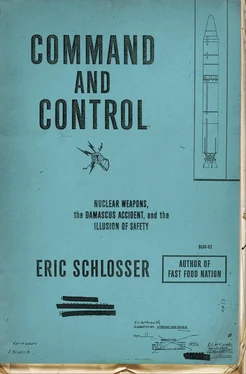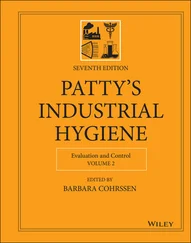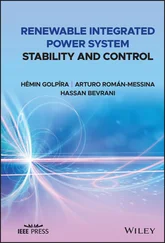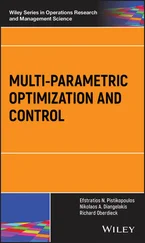• • •
NEAR THE TOWN OF GREENBRIER, about ten miles south of Damascus, Sandaker spotted a couple of security police officers. He stopped the pickup and left two injured men — Hanson and Archie James — with the officers. Then Sandaker did a U-turn and drove north. He wanted to get back to the missile site.
• • •
THE HOSPITAL IN CONWAY REFUSED to admit the injured men, claiming that it lacked the authority to treat Air Force personnel. Childers demanded that they be treated and took full responsibility for their care. On the way to the hospital, while sitting in the backseat of the station wagon, Joseph Tallman — the PTS technician who’d carried Hukle from the field — had gone into shock. The refusal to admit these injured young airmen, at four in the morning, about half an hour away from another hospital, seemed in keeping with the spirit of the entire night. The hospital finally agreed to treat them, and Childers called the command post in Little Rock to say where they were.
• • •
A FEW HOURS EARLIER, at about one in the morning, after escorting a flatbed truck with light-all units to Launch Complex 374-7, Jimmy Roberts and Don Green had asked if there was anything else they could do to help. They were security police officers with a pickup truck. Devlin and Hukle had not yet broken into the complex with crowbars. Everybody was still waiting for instructions from SAC headquarters.
Sergeant Thomas Brocksmith, the commander of the security police at the site, asked Roberts and Green to drive along the roads surrounding the complex and check on the security officers who were manning the roadblocks. Brocksmith wanted to make sure that all the officers knew how to use their gas masks — in case anything went wrong. Roberts and Green got into their truck and drove along the roads surrounding 4–7. They chatted with security officers at the roadblocks, showing them how to use the masks. Most of the officers didn’t know anything about the Titan II or the danger of its propellants.
At about three o’clock, Roberts and Green were on a road about half a mile southwest of the silo.
The sky lit up.
“Man, ain’t that pretty,” Roberts said, not realizing what had just happened.
A moment later the blast wave shook the pickup so hard it almost went off the road. Roberts and Green quickly put on their gas masks. They had a clear view of the launch complex, and it looked like the fireball extended all the way to Highway 65. They couldn’t reach anybody on the radio and thought that everyone at the complex was dead.
We may be the only two left, Green said.
They decided to evacuate nearby homes — and then heard Sergeant Brocksmith on the radio, calling from the grocery store in Damascus. He told them to evacuate the homes south of the launch complex. They drove east, reached Highway 65, got out of the truck, banged on the doors of small farmhouses and mobile homes, told people to leave at once. Despite the disturbing, early-morning sight of two men in battle fatigues and gas masks standing at the front door, most of the homeowners were grateful for the warning. But one man opened the door, pointed a handgun at them, and said, “I’m not going to leave.” They didn’t argue with him.
Roberts and Green were about a mile north of Damascus when they heard the following exchange over the radio:
“Help! Help me. Help me! Can anybody read me?”
“Yes, we can hear you.”
“Help me!”
“Where are you?”
“This is Sergeant Kennedy.”
“Where are you, Jeff?”
“Colonel Morris, I’m down here by your truck, please help me… my leg’s broke and I’m bleeding.”
“Where are you?”
“I’m down here in your truck!”
Roberts and Green had assumed that they were the only people anywhere near the launch complex. Neither of them had ever met Jeff Kennedy, and they didn’t even know who he was. But they weren’t going to leave him out there. Green turned the pickup truck around and floored it, driving all out, pedal to the metal.
About a minute later, the pickup died right in the middle of Highway 65. It had run out of gas. They got out and pushed it to the side of the road. A passing Air Force truck refused to stop for them, even after they chased it, yelling and waving their arms. The driver of a civilian vehicle swore at them and kept going, when they tried to flag it down. Roberts spotted a Cadillac parked in the driveway of a nearby home, ran over to it, broke one of the windows with a rock, and started to hot-wire the car.
Green was impressed, but not surprised, that Roberts knew how to do that.
A pickup truck approached at high speed from Damascus. Roberts and Green left the Cadillac and stood in the highway, blocking both lanes. They figured: if the truck runs us over, to hell with it.
The truck stopped, and they commandeered it. The driver, Jim Sandaker, insisted on coming with them to the launch complex.
They said, Fine, but get in the backseat.
Green floored it, and the three set out to find Jeff Kennedy.
• • •
ONE MOMENT KENNEDY HAD BEEN looking at the ground in front of the access portal, getting ready to sit on the curb. And the next moment he was soaring through the air, spinning head over heels, like an acrobat from a trapeze. And then he blacked out.
When Kennedy opened his eyes, he was lying on his back, and his legs were pointing toward the sky, propped against a chain-link fence. Fires burned all around him. He screamed and yelled for help. But nobody answered.
After lying in that position for a few minutes, wedged against the fence, something inside Kennedy clicked. The choice became clear: he could get up and go — or stay there and die.
Kennedy pulled his legs off the fence, stood up, and immediately fell down. He saw that his right leg was broken, and the rest of him felt bruised and cut up. His helmet was gone. His face was bleeding. After falling down, Kennedy said to himself, “I am not going to die on this complex.”
Using the fence for support, Kennedy pulled himself up and tried to get his bearings. The launch complex was nothing but rubble and flames. It took a little while, but he figured out where he was. The blast had hurled Kennedy about 150 feet through the air. He’d landed upside down against the fence in the southwest corner of the complex. He decided to follow the fence east, toward Highway 65, and then north, hoping to find the hole they’d cut in it. The fence gave Kennedy some physical support and a sense of direction, but it also imprisoned him inside the complex. He couldn’t climb over it, with a broken leg. Until he could find a way out, he was trapped there amid the fires and debris and toxic smoke.
Every few steps, Kennedy fell down. The RFHCO suit was heavy and cumbersome, and without the helmet, it no longer served a useful purpose. It was slowing him down. Kennedy sat on the ground, took off the air pack, and got his arms out of the RFHCO. But he couldn’t pull the suit off his broken leg. He searched the ground, found a jagged piece of metal, and cut the RFHCO suit off above his boots.
Kennedy walked and fell, walked and fell, tripping over debris, looking for the hole in the fence. From somewhere in the darkness, he heard Livingston’s voice, crying out.
“Oh, my God, help me. Please, somebody help me. Please, God, help me.”
“Livy, I’m going for help,” Kennedy shouted.
Livingston didn’t seem to hear him.
“Oh, my God, help me,” Livingston repeated. “Please, somebody help me.”
Kennedy had no idea where Livingston was. The only sign of him was his voice, calling out.
“Please, somebody help me.”
Kennedy kept walking, falling, and getting back up, aware that both of their lives were now at stake. The pain in his leg became excruciating, and he didn’t think he could walk any farther. He started to panic. He thought about his children, his wife. He didn’t want to die on this launch complex. He shouted for help, but nobody answered. And then he told himself to shut up and walk.
Читать дальше












